Mudhoney's Dan Peters: “In my old age, the red light scares me”
The grunge pioneer talks breaking out of Seattle’s underground punk scene, playing atop the iconic Space Needle, and never worrying about hit singles
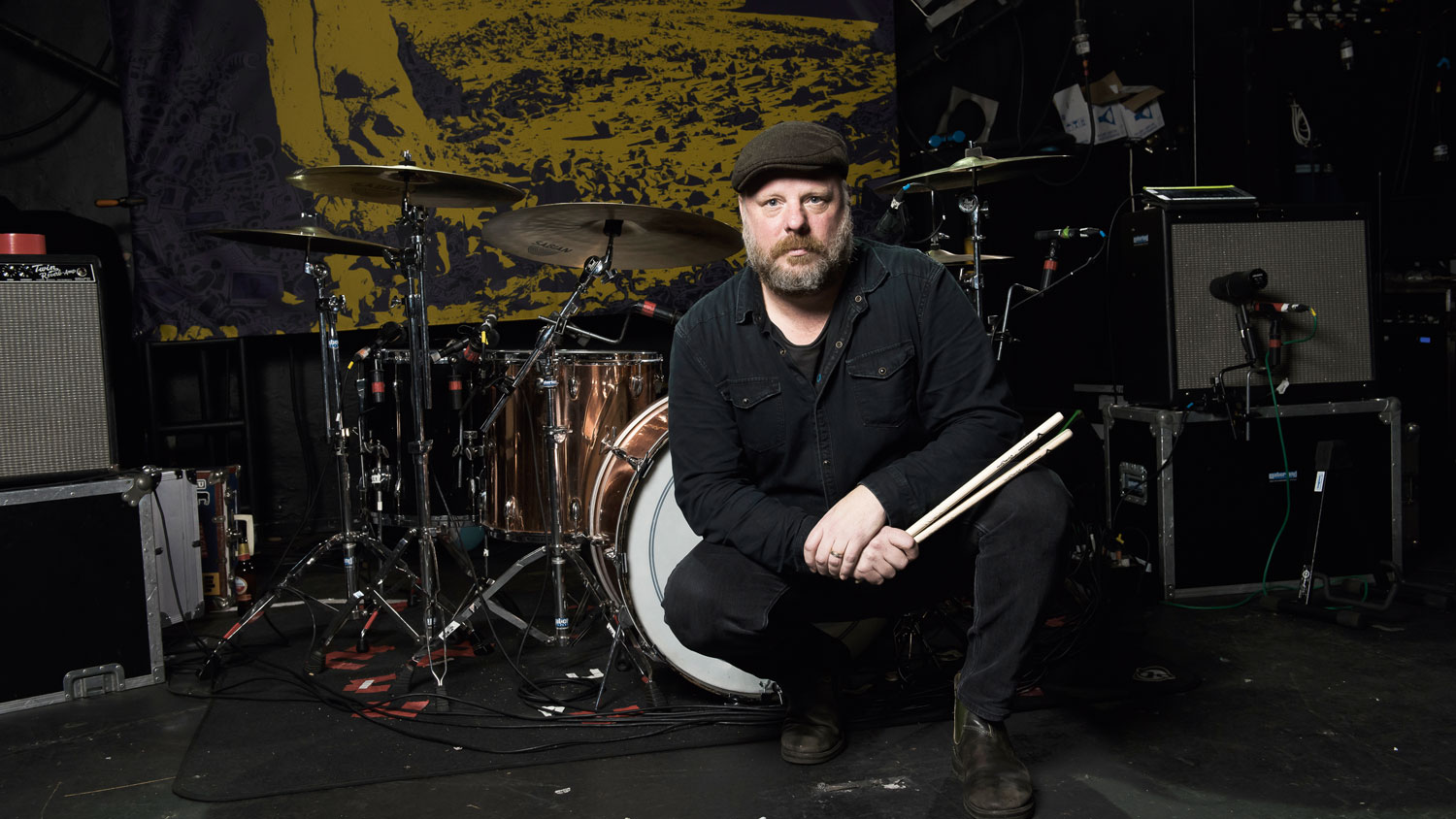
Mid-1980s, Los Angeles was the centre of the rock universe, with its legion of hair-sprayed glam metal bands pouting in glossy music videos. Then out of the north west came a roar of distortion and angst that swept the LA hair bands out of the way and out of fashion in one fell swoop.
While Nirvana, Pearl Jam and Soundgarden might have been the heavyweight attractions of the nascent grunge movement, it was Mudhoney who laid the foundations. Their 1988 single ‘Touch Me I’m Sick’ was a ferocious blast of punk and garage rock, powered by the hammering drums of Dan Peters.
Introduced to bands like Roxy Music by his uncle, Peters was always attracted to music outside the mainstream. “I discovered Gang Of Four when I was in the eighth grade. Hugo Burnham’s drumming style blew my mind,” he says.
Peters served short stints with Nirvana and Screaming Trees before it seemed that fame beckoned when Mudhoney signed to Reprise Records in 1992. Yet the band never did fit the rock star mould, producing music that’s acerbic and laced with a twisted sense of humour.
With their bristling new album Digital Garbage on Sub Pop Records, the label where it all began 30 years ago, they’re still playing to packed houses. When we meet Peters in London, the band is about to play to a sold-out Electric Ballroom.
Sub Pop were really great in the early days because it had nothing to lose by over-hyping stuff
You grew up around music, your mom was a singer in a lounge band?
“She was, yes, in the 70s. She was doing standards of the time, a lot of Barbra Streisand, she would do The 5th Dimension, radio hits. Our family was pretty poor, my mother tried to make a living singing but other than that she bartended a lot.
“At the time of becoming a drummer, I never had any grand plans of how this was going to work, but I saw my mom could make a living singing seven nights a week. I had that as a goal I set for myself. I didn’t do well in school, so I thought if I can work playing music every night of the week, that would be nice.”
When Mudhoney formed, was there already a scene around Seattle?
“There was an underground punk scene in Seattle that started in the late 70s. By the time I started playing music there, which was 1983, there was a core group of us. There was one club where we could all get together and play. That was only open for a year, maybe two.
“My band would play there, Mark [Arm, Mudhoney vocalist] and Steve’s [Turner, guitar] bands would play there. Matt Lukin, our old bass player, his band The Melvins would play there. Soundgarden would play there, all these musicians in Seattle, all the Pearl Jam guys, we went to this little club and once that closed down we were able to find a few other places to play. We’d all be at the same shows and playing in each other’s bands.”
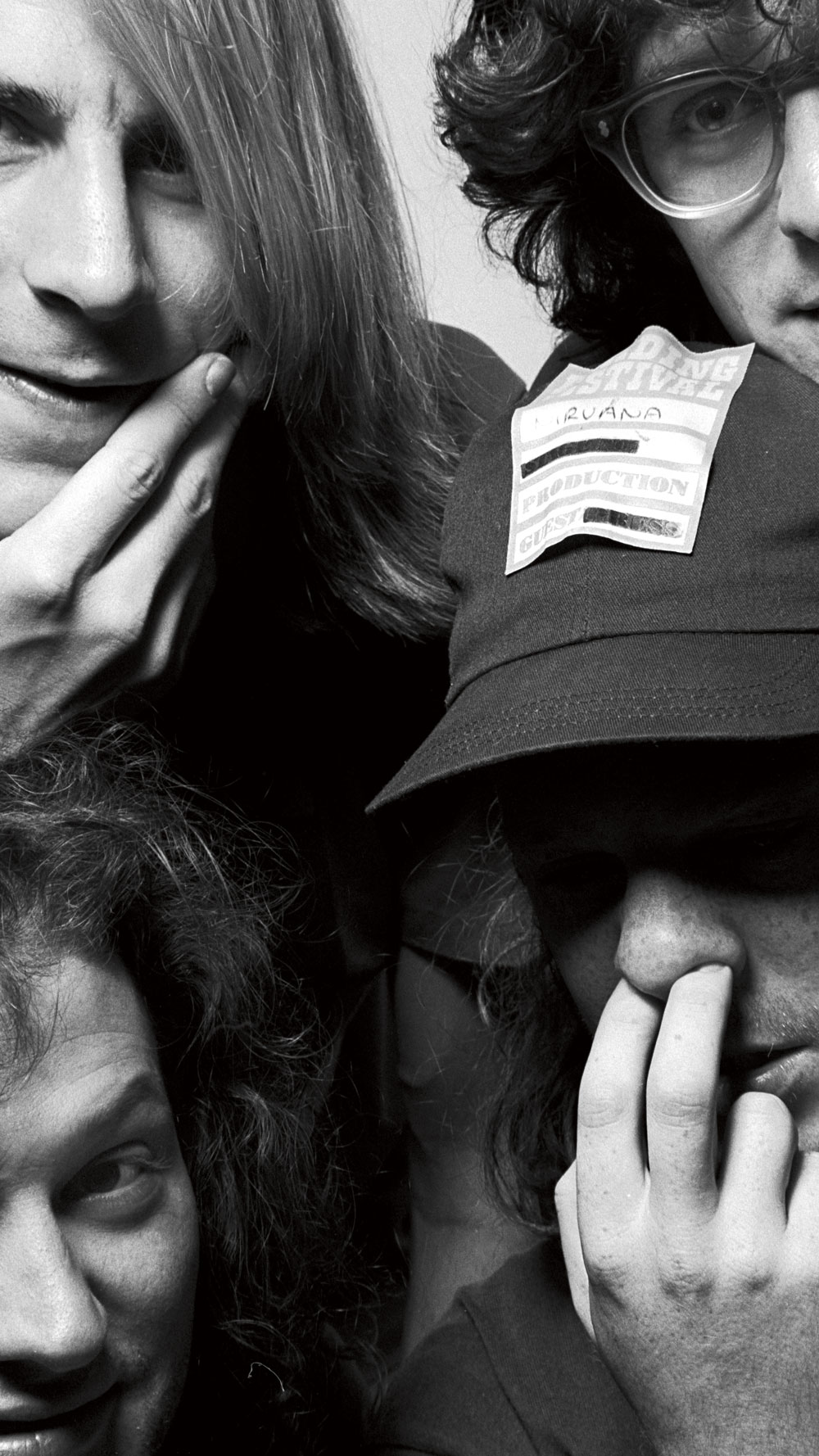
When did you realise the world was starting to notice Seattle?
“In ’88 we put out the ‘Touch Me I’m Sick’ single. Sub Pop were really great in the early days because it had nothing to lose by over-hyping stuff. John Peel heard that single and started playing it.
“We got flown to Germany for one show in ’88 and people were really digging it. We met a lot of people that wanted to book us and wanted to put out our records in Europe. It was very crazy to think we could have an international record label and a local record label, both of them promoting at the same time.
“Once we came over to Europe and England, we knew something was up. The first time we went to Europe we thought it would be our only chance to ever do it, so we booked a nine-week tour with no days off. I don’t think it was our idea not to have any days off, that’s just the way it happened!
“By the end of that nine weeks we all went insane, but then we went home. We came back really quickly after we had time to recoup and we realised we could get out there again. Touring at the time was hard but it was very exciting. To be able to leave our little small town in Seattle and travel the world was pretty crazy.”
It seemed like the record business didn’t know what was going on and they were grabbing everything that might be grungy and signing it
Was there a learning curve to adjust to playing every night of the week?
“The worst thing was that we only had an EP and a single out. We had some songs we hadn’t recorded yet for our first album, so we very quickly started learning some covers. We’d sit in the van, play a tape, try to learn a song and rehearse it at the gig that night so we could add another song to the set. We realised we were under-prepared to say the least.”
When you signed to Reprise Records for Piece Of Cake, did that give the band’s profile a big boost?
“Sub Pop were having some financial difficulties at the time and looked like they were going to go out of business. We had just recorded with them, they put it out and subsequently that record helped the label stay afloat, but in the meantime, there were a few labels that were interested in signing us.
“Nirvana hit and everybody was looking to sign any band from Seattle. We met with Reprise. For me, the fact that my band was getting signed to a major label was crazy. I grew up wanting to play music my whole life and not only was I getting to do it, but I was signed to the same label as The Kinks and Jimi Hendrix, Frank Sinatra...”
From the outside it seemed like the whole axis of the rock world shifted to Seattle.
“It was funny to everybody, it seemed like the record business didn’t know what was going on and they were grabbing everything that might be grungy and signing it. So many bands got signed and dropped. You’d talk to your friend in a band, ‘Who signed you guys? What deal did you get?’”
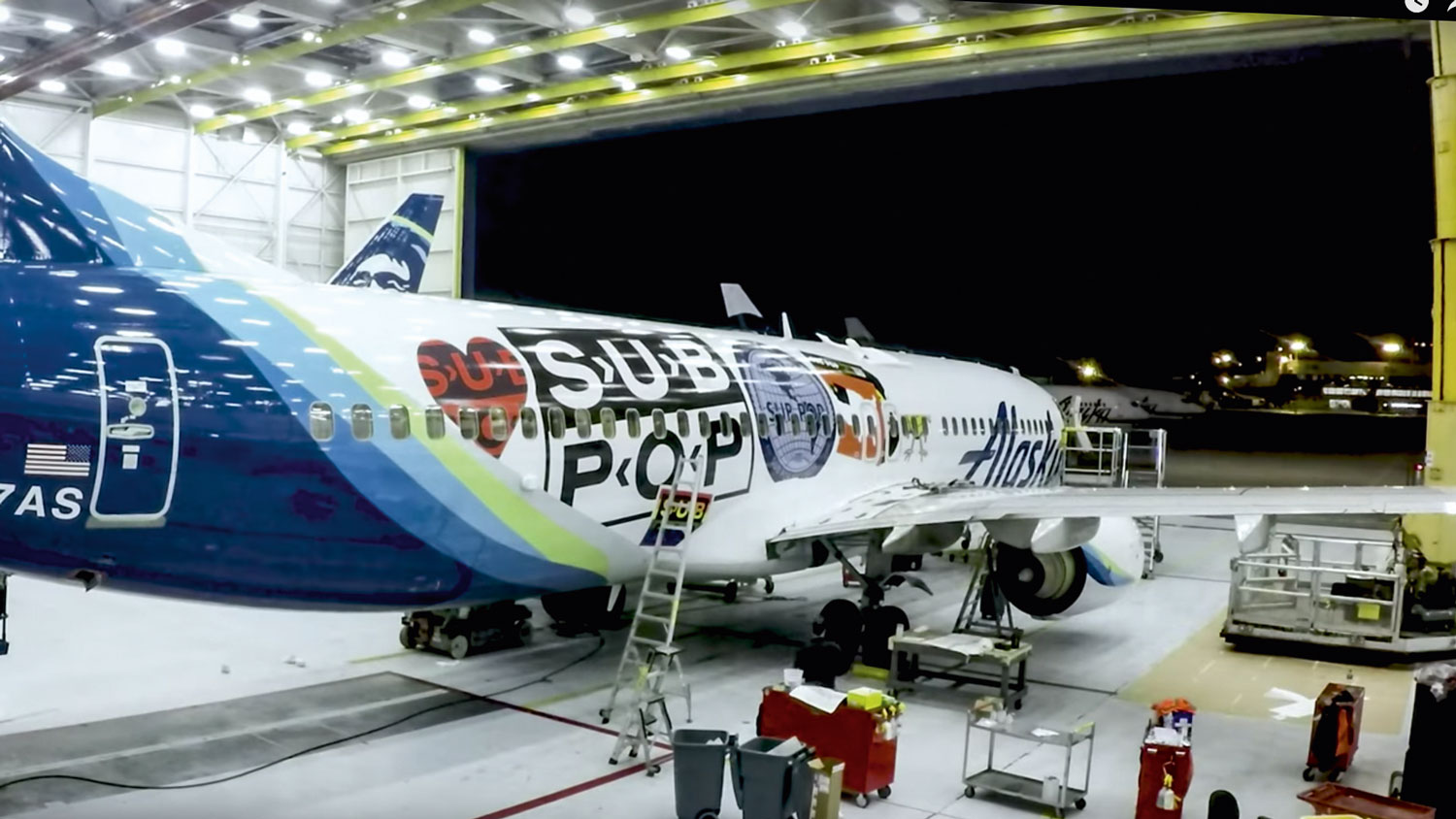
Shortly before Mudhoney signed with Reprise, you were playing with the Screaming Trees?
“I had played with Nirvana for a short period of time, because our guitar player Steve went back to school and wasn’t able to tour. We had just started rolling and I realised that this is what I wanted to do. Nirvana were looking for a drummer so I stepped into that spot for a short period.
“Then Dave [Grohl] came along so that’s the way that one worked out, but the Screaming Trees were looking for a drummer at the time as well. I played with them for almost a year, I just did touring with them and some B-side stuff. Then Mudhoney started to get active again so I went back to my boys.”
I understand tape and the faders and the board. Clicking a mouse seems weird, you lose all of us with that
When you were dropped by Reprise at the end of the 90s, did you worry that might be the end?
“At the same time we got dropped from Reprise, our original bass player quit. I was like, ‘I guess that might be all she wrote,’ but it was never actually said. I got burned out myself and the thought of getting another bass player didn’t really appeal to me.
“We went our separate ways for a year but during that time I was like, ‘I don’t want to stop doing this,’ and Mark and Steve didn’t either. It didn’t take too long for us to get back together. Mark had had some drug problems in the past and he got all that stuff ironed out, so it was easier to change my mind.”
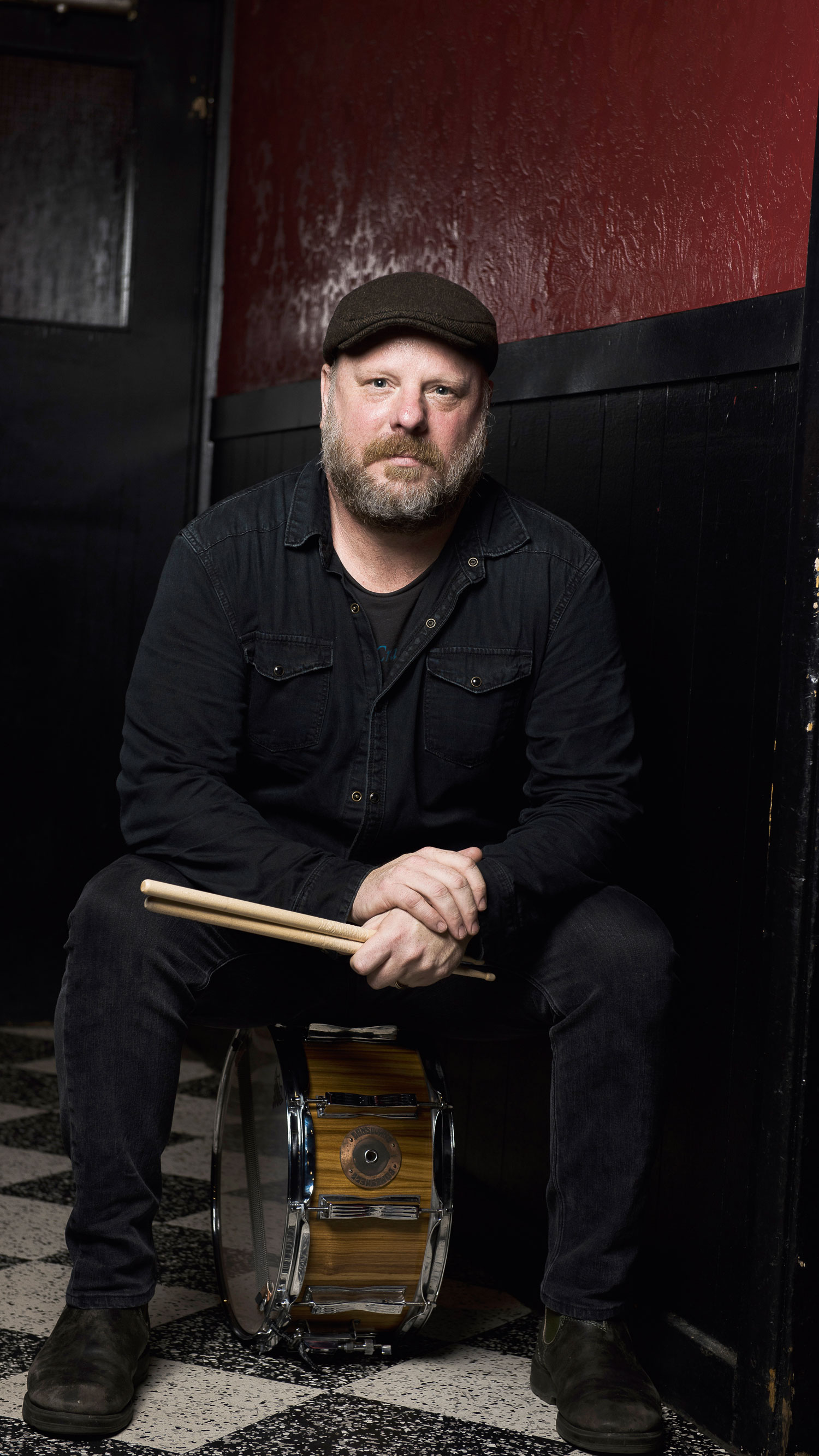
Bands seem to split because they never take a break from the record/tour/record cycle?
“A lot of the problem with bands too is that they’re searching for a hit and if they don’t ever get it then they just get disillusioned and break up. We always knew that we weren’t a band that had hit potential.
“We understand our limitations and embrace our limitations as opposed to searching for that hit. We never worried about that. We never put that pressure on ourselves.”
Recording your new album, Digital Garbage, did you play live? Do you work to a click track?
“It’s all live, I’ve never done a click track. Some people would want me to, but I can’t do that, so everything is live. We’ve always done that. We did a BBC session today, four songs, I was in and out of there in two hours. I was very happy with that.
“I like the studio a lot because that’s where you’re coming up with the finished product. It’s always satisfying. I find myself recently being more nervous in the studio. I don’t know why. In my old age the red light is starting to scare me.”
I find myself recently being more nervous in the studio. I don’t know why. In my old age the red light is starting to scare me.
Do you record to tape?
“Yes. This last record we did at Studio Litho, it’s owned by Stone Gossard from Pearl Jam. He’s had it for a long time. Straight to tape, we never dumped it to Pro-Tools, we did all the editing splicing tape. It might have got dumped onto some digital thing after the mix. It’s not a foreign thing to us.
“The weird thing to us is seeing a computer screen with everything on it. I don’t understand that. I understand tape and the faders and the board. Clicking a mouse seems weird, you lose all of us with that.
“I had a conversation with a guy the other day, he’s a metal drummer, and he was bemoaning the fact that he went in to record some music and the producer wanted the band to play live.
“He’s like, ‘Man, give me a click track, I’ll lay my drums down and then the other guys can play to it.’ I’m like, ‘I don’t know who you are, I don’t think you know who I am, we live in two different worlds.’”
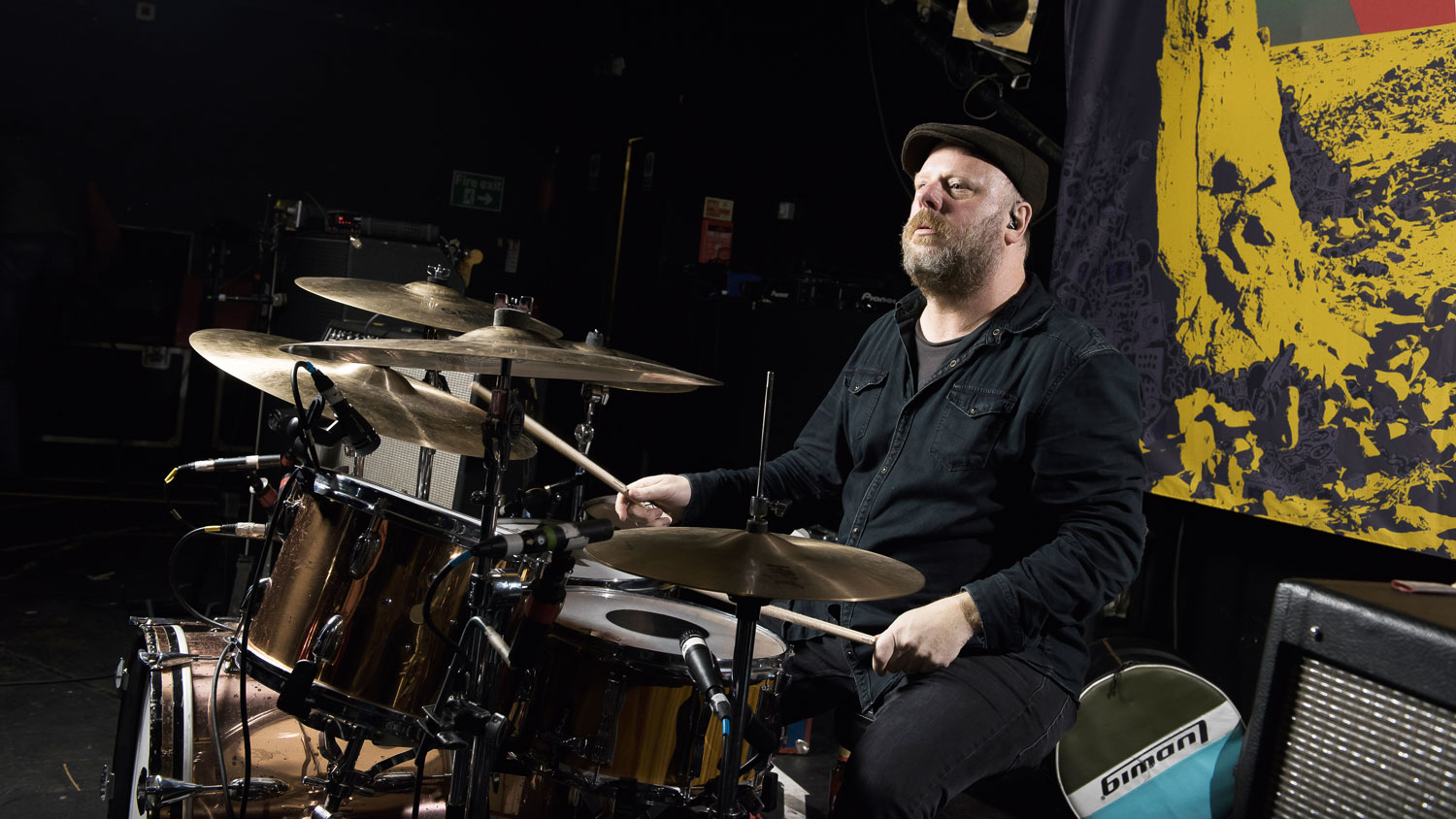
Do you tend to follow the guitars or the bass as a drummer?
“In the early days, a lot of our songs were guitar-riff driven, so I locked in with the guitar more. Don’t tell our bass player that. It’s a weird way to go about things, but it made everything flow in a way that I liked.
“This record, our bass player came up with a lot of the main grooves, so this record has a different feel for me, I’m probably locked more with the bass than guitar.”
And there’s Mudhoney’s first song in 6/8 with ‘Messiah’s Lament’
“Yeah. That’s a song that I wrote, it’s my first contribution as a songwriter. I’ve been playing guitar for the last several years and I’ve come up with songs, but I never showed the guys in the band. I never had that confidence to do it until now.
“It’s been five years since we made a record, I don’t know when we’re going to make our next record, so it’s like, ‘What do I have to lose?’ They were kind enough to listen to it, Mark put words to it and it made the record.”
After all these years of drumming, do you need to warm up?
“I never do any of that. I have aches and pains, I did go through a bout of bad carpal tunnel with my arms going numb during gigs that has seemed to have subsided.
“I reach a point midway through every set, there’s one song in particular called ‘No One Has’ that starts to bother my hands, but then we get through that and it starts to go away. It’s never been anything I do. I never warm up, I’m always too busy chatting or meeting people. I probably should.”
How much of your life is busy with Mudhoney?
“It’s increasingly a smaller percentage. We only do a couple of tours a year and they’re fairly small time-wise. I play with another band in Seattle, mostly in town, we’ve toured Spain. I think it would be nice to do a little more touring, but I like the amount that we do because it makes it more special as opposed to making it be the thing we have to do as opposed to want to do and get excited about.
“I have three kids at home, I do stuff at the house and tend to the kids. They’re getting older now, my daughter turned 18, she doesn’t need any tending to. Fifteen and 12 are the other ages.”
What’s Seattle’s music scene like now?
“Any given night touring bands are there, there’s a bunch of clubs, you can go see a band any night of the week. Back when we were starting, there were no clubs to play so it was mostly illegal parties and rented halls that weren’t supposed to be used for what they were being used for. It’s thriving but it’s a scene I don’t have much to do with these days.
“There are a lot of young bands that I don’t really follow but that’s one of the other things that’s cool about playing in my other band. We play the clubs around town and we play with a bunch of scrappy bands, so I do get to see what’s going on in Seattle. It’s a huge city right now, it’s been growing.
“There are 2,000 people moving to Seattle a month, because of Amazon. It’s becoming a multicultural city and it was never that. It’s great but it’s become insanely expensive. Luckily, we all made wise choices and bought houses with that Reprise money instead of making a record.”
What have been your proudest moments with Mudhoney?
“One of the crazy things that happened to us was playing on top of the Space Needle, we were the first band ever to do it. It was our 25th anniversary, we got put on top of the Space Needle, we played a full set, a helicopter filmed it, all the news people were there.
“And the fact that we had made 25 years as a band, I was very proud of it and felt like we had accomplished something, and we were being respected for it and people were acknowledging and celebrating it.
“And I’m also proud that now it’s 30 years we’ve been a band, we’re able to travel, see places and play for people that seem to be enjoying themselves immensely. It’s as simple as that. That’s what gives you the satisfaction of knowing you’re not just flogging a dead horse.”
Do audiences still expect to hear ‘Touch Me I’m Sick’?
“I’m sure they do and that’s fine because that song has served us well. If people want to hear that song, they can definitely hear it because we play it every night!”
Dan On Record
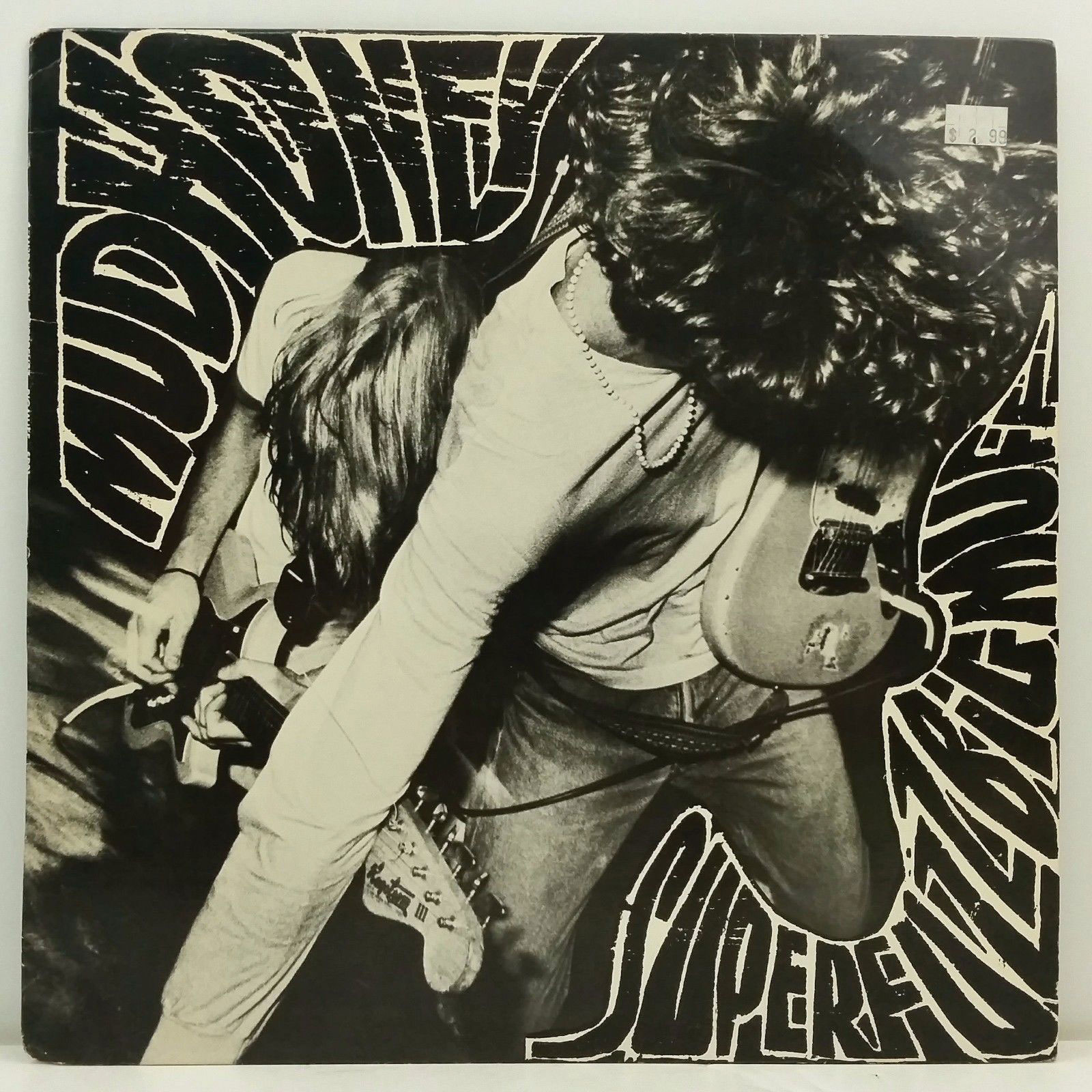
Essential Albums
Mudhoney (1989)
Mudhoney’s first full-length album, following the Superfuzz Bigmuff EP the year before, mixes up the proto-punk of The Stooges with the sludginess of The Melvins. Highlights are the heavy swagger of ‘You Got It’ and the tumbling drums of ‘Here Comes Sickness’.
Every Good Boy Deserves Fudge (1991)
The band really started to hone their own sound on Every Good Boy Deserves Fudge and Peters even plays brushes on ‘Good Enough’. “I’m not quite sure what inspired me to do that,” he says. “I have no idea why. I just wanted to mix it up and try something that we hadn’t done before.”
Piece Of Cake (1992)
They might have signed to a major for Piece Of Cake, but Mudhoney lost none of their edge in the process. The songwriting combines the catchy hooks of ‘No End In Sight’ with the raw riffage of ‘Suck You Dry’ and the slow grind of ‘Take Me There’.
My Brother The Cow (1995)
While Pearl Jam, Nirvana and Alice In Chains were all about the angst, Mudhoney sneered at the world. Working with Jack Endino, who produced Nirvana’s Bleach, the production is unvarnished. ‘Orange Ball-Peen Hammer’ sounds like a demented Led Zeppelin, and ‘1995’ is pure fuzz.
Since We’ve Become Translucent (2002)
Regrouping with new bassist Guy Maddison and returning to Sub Pop, Mudhoney do what they do best, making a lot of noise – with added wailing saxophone on ‘Baby, Can You Dig The Light’. “There are what I consider to be two Mudhoneys,” says Peters. “There’s Mudhoney before Guy and Mudhoney after Guy our bass player, and I like the second.”
Vanishing Point (2013)
Album nine sees Mudhoney mixing it up a bit. There’s the frantic attack of ‘Chardonnay’ with Peters going hell for leather, while ‘Douchebags On Parade’ adds some psychedelic acid rock to their sound. ‘I Like It Small’ is all snotty attitude.
Digital Garbage (2018)
The band have never sounded angrier than they do on Digital Garbage. “When you’ve got Donald Trump as your president, you’ve got a lot of fodder there,” says Peters. “Mark does it with a sense of humour, so it doesn’t sound preachy.” ‘Please Mr Gunman’ is excoriating.